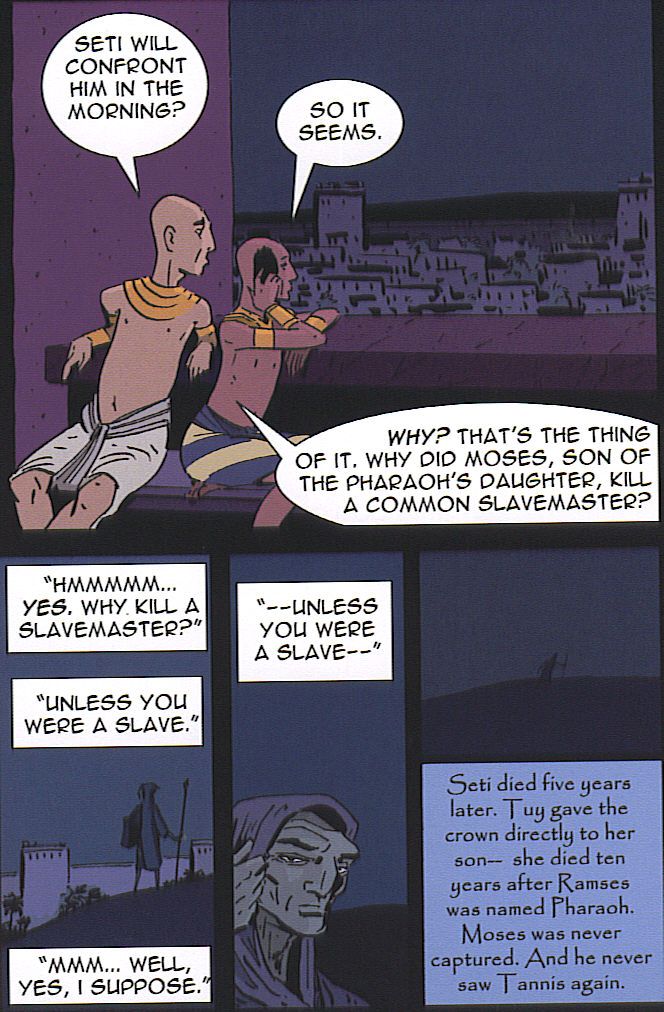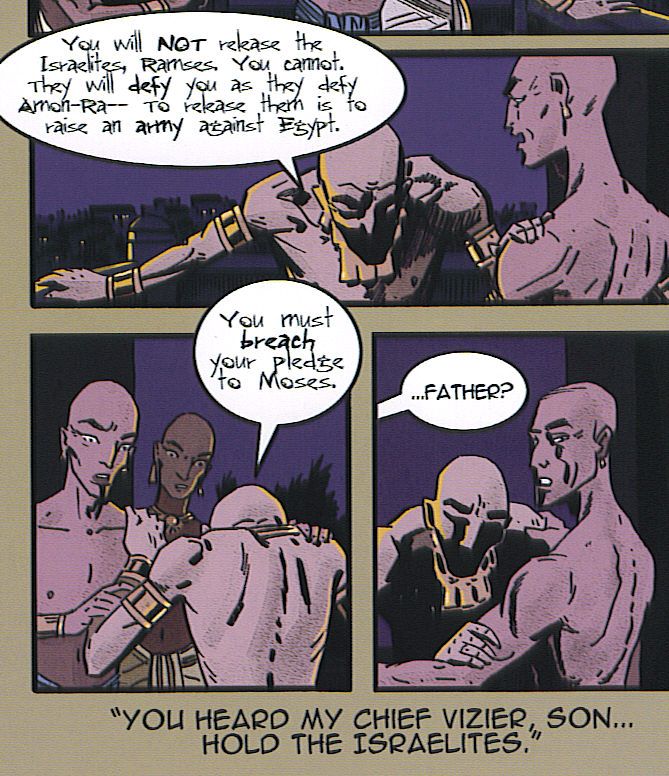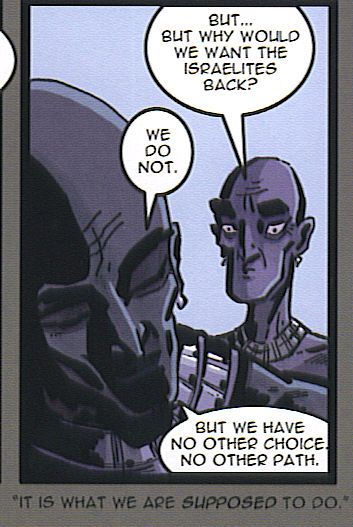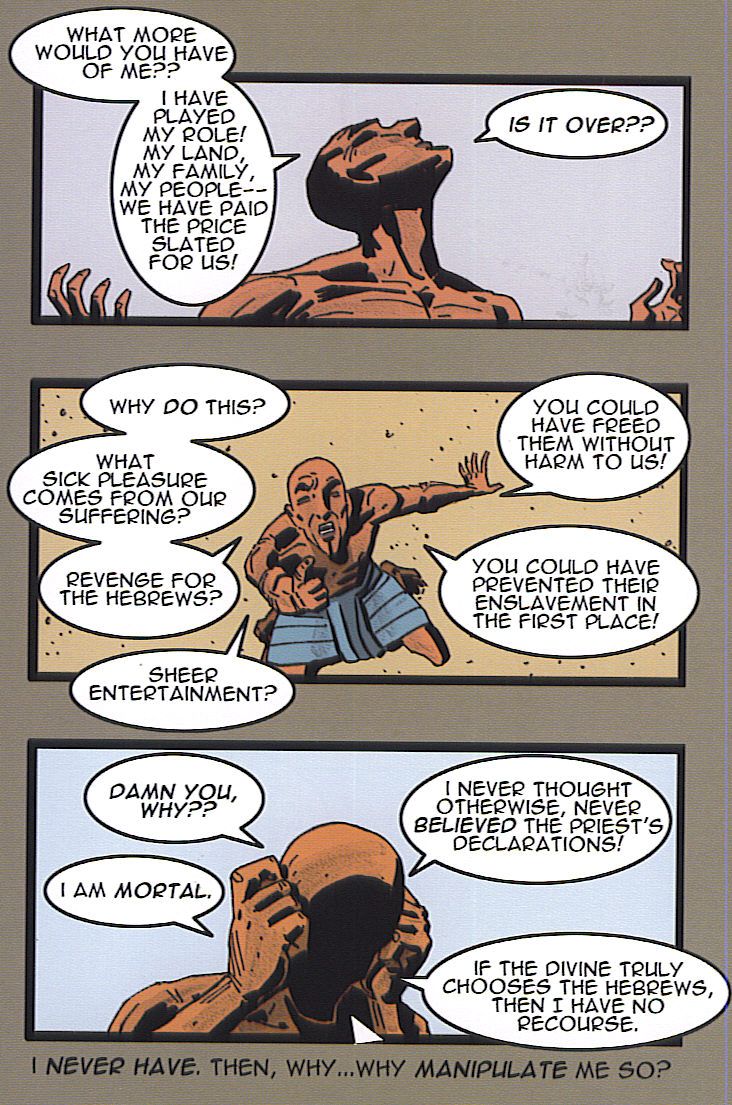My next batch of questions is with A. David Lewis, whose graphic novel The Lone and Level Sands was re-released in color recently (I reviewed it here, if you're interested), and who has a short mini-series (two issues), Empty Chamber, coming out soon. He's also going to be a doctor in the not-to-distant future, so you know he's erudite. Let's check out what he has to say!
1. Concerning The Lone and Level Sands, why did you decide to retell the story of Exodus?
Sure would have been easier to sell a superhero book, let me tell you. But, in the end, I found that the characters and setting really interested me (as well as what Marv Mann could do with them visually). That is, like many people, I've had this story clunking around in my head for quite a while, yet it had been a long time since it really meant something powerful to me. (No slight meant there to Passover and such; I meant, from the perspective of narrative, the plot - rather than the miracles - didn't move me.) So, after having taken a Biblical Literature class as part of my studies at Georgetown University, I stumbled backwards over a new way to tell it that, simply, excited me for the first time about the whole tale from the storytelling perspective.
2. You concentrate far more on Ramses than Moses in the book. Why? Was it because Ramses, as the "villain," is more interesting than Moses, or was it something more mundane like space constraints?
There are several reasons, the least of which being that, in most tellings of this tale, Moses gets a lot of 'face time,' and we only glimpse Ramses from his perspective. Further, we get to follow Moses through a lot of Exodus, seeing a number of his adventures and obstacles, getting a solid sense of him. I never felt we knew Ramses, even as a villain. I was interested in exploring Ramses' additional roles as a ruler, a statesman, a son/father ... and, of course, a slavemaster, the one to which most readers of Exodus default.
The goal was never to redeem him (or Egypt) for slavery; I like to think I keep that albatross pretty well hung around their collective necks the whole time. Rather, I think it's a mistake in any era to see an opponent as simply an adversary; to use the modern parlance, I don't believe in "evil-doers." People can do horrible things, but they're not designed for evil, per se; there's a rationale behind it all as well as a life and a psychology. Even the movie Max makes young Hitler somewhat sympathetic, a victim of his own neurosis.) So, if anything, I was aiming to look at everyone as essentially human - rather than everyone in a certain two-dimensional role - and then go from there.
3. What sources did you use beside the Bible and the Koran? How were they helpful?
I admit to having a number of pop culture sources sprinkled in there. There's a moment of Edward G. Robinson's "Where's your God now?" thrown in at the end of one of the chapters, and even DreamWorks' Prince of Egypt - which, on the whole, I didn't really enjoy - did color my view of both young Moses in the Pharaoh's court and the place of Miriam in the story.
Both Marv and I consulted a number of anthropological and archeological sources for an accurate sense and depiction of both the time and location. Likewise, I read up on the rule of Ramses and his bloodline during the New Kingdom period of ancient Egypt and even got to see some of the remains at the British Museum while I was overseas. Lastly, there's an obvious debt we owe to Percy Blysshe Shelley's "Ozymandias", from which the title of the book - and a number of its themes - are taken.
4. I mentioned this in my review: God is the real villain of the piece. Was this the idea from the beginning, or did it stem out of the writing and the attempts to humanize Ramses? In other words, how much of that was planned?
I'd like to say that it sort of sprung out of the outline I created early on in the process - but, then again, it could also have been my subconscious at work, too. This is definitely seems to be my flourish with the story, stemming from the fact that we all know how it's going to end. That is, I was never going to surprise readers with the plot of this book; we all knew point A, point B, point C, etc. If there was any narrative tension, it was in leave people guessing how Marv and I would get the characters from point to point as well as how they would react. Therefore, they, like us, were locked into a set of events that, largely, they couldn't change. This also dovetails nicely with my personal reading of Exodus, which is basically the notion that the Ten Plagues were going to be handed down as punishment no matter what Ramses did. He could have genuinely wanted to let them go at any point - which he really seems to want in the Bible until "God hardened Pharaoh's heart" - but I think having all these progressively nasty disasters occur was slated to happen; it was foretold, it was predestined.
So, if I really spun the exegesis of any Biblical line, it was my reading of God hardening Pharaoh's heart. It's an odd moment in Exodus that comes up a number of times, and it could easily have been written another way. I readily admit, though, that this is a matter of interpretation up for plenty of debate but ... Yeah, we definitely back God into a corner.
At the same time, I also do something equally heretical by equating myself (or the narrator) to God by the book's end. Ramses at the end, all alone, gets to finally challenge the course of events. He basically tells off the narrator/me. And the narrator seems, if seen a certain way, to relent, ultimately letting Ramses go back to having free will and creating his own destiny. Therefore, while Moses' people are still in Egypt, God calls the shots; likewise, while he's in the book, Ramses' all mine.
Which is worse - Making God the "villain" or equating myself to Him?
5. You have mentioned it took you a while to put the project together. How long did it take, and why did it take so long?
When Marv and I were first casting about for a project to do together, I presented a number of ideas of which Lone and Level Sands was only one. After deciding on it and feeling each other out with a trial-basis Prologue, we felt that our styles matched well and that we had a similar read on the material. I went off to script, and Marv went off to draft the characters. Remarkably enough, Marv is a talented, fast illustrator, so by the third or final section of the book, we did switch to something more of a Marvel style, where my outline served as the script and the actual words came in later. Of course, Marv was flexible, giving me more room if and when I needed it, but it was a true collaboration.
The whole thing took about a year and a half. In the meantime, I'm working on other projects, both Marv and I are working other jobs full-time, and he's raising a family. We found a really good flow, though, that we're currently trying to re-synch with for our next project. Overall, I was rather happy with the speed from concept to product, given that it's an almost-150-page book!
6. Empty Chamber comes out this month, right? What's it about?
Empty Chamber is a two-part, action-espionage mini-series being released this month by Silent Devil. In essence, it's my attempt at "smart adventure." As with most espionage stories in the Nick Fury/James Bond vein, there's a heinous threat that only a clandestine group, licensed by the government, has the ability to thwart. In this case, a do-nothing Everyman doesn't know he has the secret to stopping a megalomaniac from exacting revenge on the U.S. by wiping out any further generations of American citizens. So, our Joe Average must be safeguarded by a mismatched pair of government agents - one solider, one mercenary - and kept alive until his information can be used.
And you thought Lone and Level Sands took a long time: Jason Copland and I have been slowly collaborating on this for almost three years! Until it recently crashed, I was documenting the genesis of Empty Chamber at an online production blog. I was recounting how it started as a proposal to Red Eye Press and then went into a desk drawer until, following Mortal Coils, Jason and I decided to start on a project together. After a false start on a sci-fi property (and, later, a pair of interruptions due to his work on Western Tales of Terror and a webcomic that was never truly "published"), we went to work fully on Empty Chamber.
7. Why did you decide to go in a completely opposte direction with Empty Chamber?
Two reasons, really. Both Mortal Coils and Lone and Level Sands were so damn serious! I mean, I like the academic stuff - I like to think I have a knack for it - but I was really just looking for something where I could enjoy the storytelling exclusively. There are still elements of background work that I did for Empty Chamber, sure, but I basically got to have fun and do a "kiss kiss, bang bang" sort of book; even with my own reading, these are the two poles I always orbit.
Then, there's the other reason, that being the mis/over-use of the word "terrorism" these days. It's gotten pretty bad. I'm not suggesting (in any way!) that there aren't people out there employing terrorist tactics to do Americans harm ... but they're tactics, not ideologies. Therefore, I wanted to play - as in "examine," along with my "fun" play above - with some ideas of patriotism, America, and, yes, terrorism. The thing here is that the only foreigner in the whole book is actually our hero. This is a story of terrorism being committed by Americans at Americans.
8. How long have you been writing comics? What else have you done?
My interest and affection for comics goes back to childhood, without question. However, by the time I got to college, I was more interested in creative prose writing than any sort of comic book writing. They were just a hobby. However, thanks to the intercession of one professor, I was encouraged to bring my knowledge of the medium into the classroom and apply it to literary theory. That sort of kicked off my professional association to comics, starting with conference papers and lectures and then leading to my short story writing becoming comic book scripts.
I think that my scholarly angle on comics helped me break in, somewhat, in the beginning. I got little anthology stories that required a good deal of research, something that I was not only willing to do but that I actually enjoyed! That led to some editing gigs, online journalism and column-writing, contributions to charity books, and eventually my own self-published stuff. It also wove a nice network of colleagues and artists with whom I would eventually collaborate. Threads, Valentine, 9-11: Emergency Relief, Even More Fund Comics, Mortal Coils, Reflux, etc. The list has been growing steadily bigger and bigger!
9. What's next on your plate of projects?
Frankly, I'm slowing down ... but just a little. As I mentioned, Marv and I have a new concept in the works which may see the light of day as early as next year. In addition, I'm among the contributors to Jason Rodriguez' Postcards anthology, teaming up with the brilliant work of artist Danielle Corsetto (Girls with Slingshots). There's long been this really serious, intensive graphic novel that I've been continually researching that remains on my mind, though it's easily years away from being ready, I'm sorry to say. Lastly - and this is really in its earliest stages - I've been talking with other independent creators about spearheading a possible 2007 Free Comic Book Day extravaganza. I'll know better on that last one come wintertime.
10. So, the Ph.D. program at Boston U., eh? Do you think you're better than the rest of us? Why Religion, specifically? And what do you plan to do with it beside get "Dr." printed on your business cards? [That's why I would get a Ph.D. I may be shallow.]
What do I hope to get from the Ph.D.? A job frankly!
In all seriousness, I knew that I would eventually be writing and teaching for my profession; the only part I never really knew was whether I would primarily be teaching with writing on the side or primarily be writing with teaching on the side. The Lone and Level Sands was a wonderful step forward for my writing, and the Ph.D. at BU is meant to serve as the response for my academic pursuits.
As for the Religion program, it's strange. I am a rather secular guy in my everyday life. I'm a sucker for a good story, though, and there are few traditions with richer narratives than the sacred texts. I respect them, please understand; I'm not just in the program to mine them for story ideas. But I want to be challenged intellectually and presented with a wider range of thought and belief. As it's designed, the BU program for Religion & Literature serves as the perfect follow-up to my English Literature background - and they're interested in comics!
Check out ADL's blog here. If you're wildly interested, read about his journey through academia here. The Lone and Level Sands has its own website. Empty Chamber had a production blog, but it went kaboom! ADL was nice enough to send along some images from the book and some sketches, but something is not letting me post them. The first issue should be out "this month," which is about as specific as small presses can get. I have pre-ordered it, so look for a review when it shows up. Ask your retailer about it!






